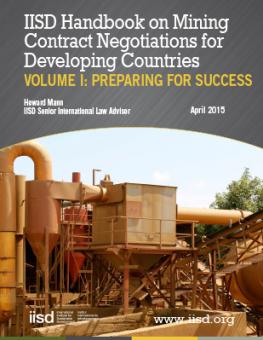
IISD Handbook on Mining Contract Negotiations for Developing Countries Volume 1: Preparing for Success
This guide is for developing countries that are engaged in various levels of mining negotiations with mining companies.
Volume 1 provides a comprehensive view of preparing for success. Many governments lack the experience or human resources to prepare effectively for a negotiation, and are unable to make the investments needed to overcome these difficulties. Yet without preparing properly, there is little hope of achieving the desired national and community objectives. This guide provides a comprehensive approach that allows governments to set priorities and address critical issues in the preparation process. It will assist governments in developing internal capacity and understanding where outside experts can best help. The guide addresses the process before negotiations begin, where the hard work gets done to lay the groundwork for a successful negotiation.
You might also be interested in
Why the Energy Charter Treaty Modernization Doesn't Deliver for Climate
The Energy Charter Conference adopted the "modernized" Energy Charter Treaty (ECT) on December 3, 2024. IISD's Lukas Schaugg explains what the modernization does, when it will enter into force, its tension with EU law, and why the reformed ECT can still hinder climate policies.
Artisanal and Small-Scale Mining of Critical Minerals
This report examines the potential for artisanal and small-scale mining (ASM) to take an expanded role in the global supply of critical minerals.
The Responsible Agricultural Investment Tool for Agribusiness and Case Studies
This report summarizes a collaboration to support agribusinesses in complying with principles of responsible investment in agriculture and food systems.
Stabilization Clauses: The hidden provisions that can hinder tax and investment policy reform
Stabilization clauses should no longer automatically be included in contracts between states and investors. If they are, they should, at a minimum, build on the latest international standards on stabilization to avoid being a barrier to sustainable development.